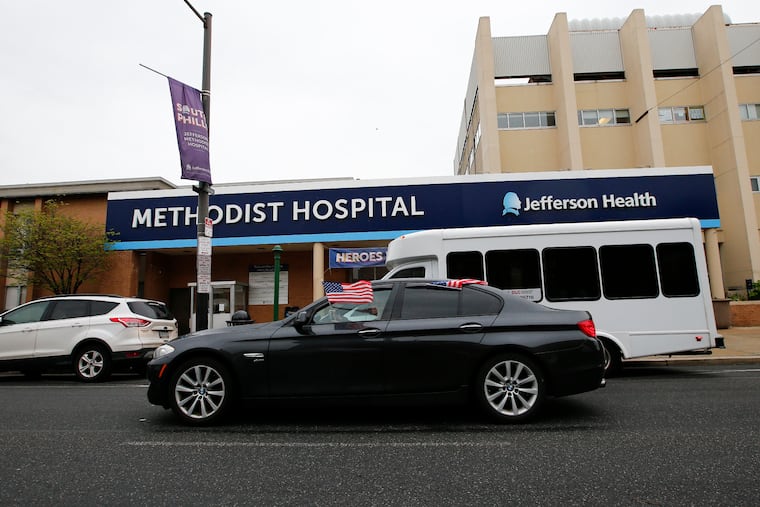Jefferson Health’s expansion hits a deep pothole with large COVID-19 loss
Jefferson Health had an operating loss of nearly $300 million in the year ended June 30.

Thomas Jefferson University received $320 million in government grants to help it withstand the financial devastation of COVID-19, but the Philadelphia region’s largest hospital system still logged an operating loss of $298.71 million in the year ended June 30.
The loss means that Jefferson, which expanded through acquisitions from three to 14 hospitals from 2015 to 2018, missed a cash earnings target required by its lenders and has had to hire a consultant to help it work on financial recovery plans. Jefferson promised to provide details on those plans by the end of this month.
The coronavirus pandemic has dealt financial blows to all hospitals, but Jefferson was more vulnerable financially when COVID-19 hit because it has struggled to boost the profitability of the 11 hospitals it has acquired in the last five years.
Jefferson said in a statement: “We are completely confident that Jefferson will move steadily toward financial recovery while achieving our mission of improving lives and living our values of putting people first, being bold and thinking differently, and doing the right thing.”
The nonprofit is among the first health systems to report financial results for the period that ended June 30 and includes the peak of the coronavirus pandemic in the Northeast. And its “results appear to be in line with what we are hearing from other health systems across the region and the country,” the statement said.
It’s true that significant losses are expected throughout health care, as are many failures to meet profitability requirements in lending agreements. But because of its extraordinarily speedy acquisition tear, Jefferson is in a different position. A deal for Einstein Healthcare Network is facing a regulatory challenge. Jefferson canceled its agreement to acquire Fox Chase Cancer Center from Temple University, calling the deal a casualty of COVID-19.
“They have not yet been able to fully integrate and optimize all of the hospitals that they’ve aggregated,” said Daniel G. Grauman, chief executive of Veralon, a national health-care consulting firm based in Philadelphia. “I think they’ve been working on it, but they’ve haven’t gotten there yet. Then you get slammed with a huge surprise.”
Grauman said that, under normal circumstances, a system such as Jefferson should have a 3% to 5% operating profit margin. The best it has done in recent years is 3%, in 2016, after acquiring Abington Health but before adding Aria and Kennedy.
COVID-19 presented extraordinarily difficult financial circumstances for health-care providers and the worst of it was felt from Maryland to Massachusetts, said Kenneth Kaufman, managing director and chair of Kaufman, Hall & Associates, a Chicago health-care consulting firm.
“That was the area that got hit the hardest when the country was least prepared. All of those hospitals that really got hit, they had to figure out what to do and how to get ahold of all of the equipment and services they needed to take care of the disease that no one really understood at all,” Kaufman said.
Expenses soared. Jefferson’s supply costs jumped 38%, as patient revenue fell 6%, to $4.2 billion.
On top of that, health systems lost a big hunk of their most profitable services: high-end radiology services such as MRIs and CAT-scans, outpatient surgeries, and elective surgeries, he said.
In the Jefferson system, for example, outpatient surgeries from April through June fell 54% compared with the same period a year ago.
Kaufman said it is too soon to know what the pandemic’s long-term financial impact on hospitals will be.
“I think there’s a pretty big difference between weakened and unable to recover. I would say a fair number of hospitals are going to wind up in the weakened state. Whether they all end up in the unable-to-recover position, it really is too early to tell,” he said.
Jefferson is in the weakened category, according to Grauman. “I don’t think they are in jeopardy of abysmal failure,” he said, but Jefferson management needs to focus on execution and integration.
“They shouldn’t be doing anything else until they get that right,” he said.